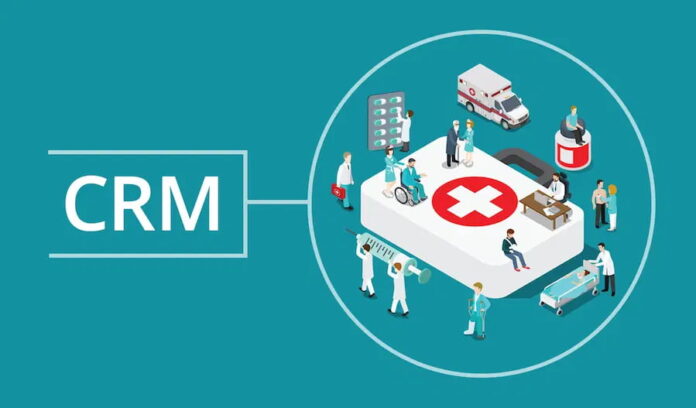Businesses use customer relationship management (CRM) systems to track and analyse customer interactions and data across the course of a customer’s lifecycle. CRM can be extremely helpful for marketing initiatives in the healthcare sector because it allows for better patient interaction, improved customer service, and increased patient retention. Healthcare businesses can develop targeted campaigns that are more likely to be effective and efficient by collecting and evaluating patient data. In this blog, we’ll examine the numerous advantages of CRM in healthcare marketing and how it may improve patient interaction and care for healthcare firms.
What is Customer Relationship Management (CRM)?
CRM is a method or approach that businesses use to track, manage, and analyze customer interactions and data over the course of a customer’s lifetime. By giving customers a more personalized and seamless experience, CRM aims to strengthen customer connections and promote business success.
This can be accomplished via a variety of strategies, including effective customer service, individualized communications, and focused marketing initiatives. CRM systems frequently come with data analysis, communication, and storage tools to help firms manage and improve their customer relationships.
Importance of CRM in Healthcare Marketing
The provision of patients with high-quality treatment and customer service is a major priority of the healthcare sector. Healthcare firms may find customer relationship management (CRM) to be a useful tool for enhancing their marketing initiatives and strengthening patient relationships.
Healthcare firms can collect and analyse patient data using CRM to learn more about their needs and preferences. As a result, it is possible to develop marketing efforts that are specifically aimed at a specific audience and are therefore more likely to be successful and connect with them.
CRM also makes it easier for healthcare firms to schedule and remember appointments, respond quickly to patient questions or complaints, and provide better customer service overall.
CRM can assist healthcare firms in boosting patient retention by enhancing patient engagement and customer service. Healthcare firms may increase patient happiness and loyalty by giving them a tailored and seamless experience. CRM can also assist in identifying and addressing any churn, assisting in retaining patients.
The capacity of CRM to enhance patient engagement, customer service, and retention is ultimately what makes it important for the marketing of healthcare services.
Improved Patient Engagement
Improved patient engagement is a key benefit of customer relationship management (CRM) in healthcare marketing.
Personalized communication with patients
Healthcare businesses can create personalized patient communications that are more likely to be successful and connect with the target audience by collecting and analyzing patient data. Personalized reminders for appointments or treatments, targeted emails or newsletters, and personalized health recommendations based on patient data are just a few examples of the various ways that personalized communication can be delivered. Healthcare firms may increase patient engagement and give patients a more seamless and delightful experience by using CRM to tailor interactions with them.
Ability to track patient interactions and preferences
Healthcare firms can track patient interactions and preferences thanks to CRM. This can assist in identifying patterns and trends in patient behavior, enabling more successful marketing campaigns and better patient care. Healthcare businesses can better fulfill the needs of their patients by customizing their communication and services by understanding patient preferences and demands.
Patient engagement in healthcare organizations can be significantly increased by the capacity to customize communications and track patient interactions and preferences using CRM. This may result in more satisfied and dedicated patients, which will ultimately fuel business expansion and success.
Enhanced Customer Service
Another significant advantage of customer relationship management (CRM) in healthcare marketing is improved customer service. Healthcare firms may enhance the patient experience by adopting CRM to simplify appointment scheduling and reminders.
Patients can simply arrange appointments and get reminders about forthcoming ones by using automated appointment scheduling and reminders. Reducing cancellations and increasing patient attendance can enhance patient care and boost financial gains for healthcare institutions.
CRM can assist healthcare firms in swiftly addressing patient questions or complaints in addition to streamlining appointment scheduling and reminders. Healthcare firms can more effectively handle and resolve patient problems by utilizing CRM to track and manage patient inquiries. Customer loyalty and happiness may increase as a result, promoting the expansion and success of businesses.
The patient experience can be significantly enhanced by using CRM to improve customer service through simplified appointment booking and reminders as well as swift resolution of patient inquiries or issues. This may result in more patient loyalty and happiness, which may ultimately fuel business growth for healthcare firms.
Improved Marketing Efforts
Healthcare firms are continually looking for methods to enhance their marketing initiatives and attract new patients in the digital age. Targeted advertising campaigns based on patient information and preferences are one efficient approach to do this.
Healthcare firms can collect and examine patient data using a customer relationship management (CRM) system to learn more about their requirements and preferences. This makes it possible to create customized marketing strategies that are more likely to be successful and connect with the target market.
These campaigns may be more effective and economical in addition to being more focused. Healthcare firms can save money by avoiding wasting resources on marketing initiatives that are unlikely to be effective by using patient data as a guide.
One effective method for these focused initiatives is video marketing. Healthcare businesses may effectively attract and convert potential patients by producing interesting and educational video content that speaks directly to the needs and interests of a particular patient group. It is possible to efficiently make videos for targeted campaigns using a video maker online.
Healthcare firms can increase their efficiency, efficacy, and return on investment by using patient data and preferences to direct marketing activities. Healthcare firms can connect with their target audience in a more personalized and effective way by implementing a CRM system and using video marketing with the latest technology like AI Text-to-Video feature that can make videos through a text script and convert it into video in few minutes.
Increased Patient Retention
Increased patient retention is a key benefit of customer relationship management (CRM) in healthcare marketing.
Improved patient satisfaction & loyalty
Healthcare firms may keep patients coming back for additional care by using CRM to increase patient happiness and loyalty. Through individualized contact and targeted marketing initiatives based on patient data and preferences, CRM may increase patient happiness and loyalty. Healthcare businesses may boost patient satisfaction and raise the possibility that patients will return for extra treatments by giving patients a more personalized and seamless experience.
Ability to identify and address potential churn
Healthcare firms can use CRM to identify and resolve potential churn. Healthcare businesses can spot patterns or trends that can point to a potential for churn by tracking patient interactions and preferences. Healthcare firms can prevent churn and retain patients by aggressively resolving any issues or complaints.
Healthcare firms can considerably benefit from CRM’s capacity to promote patient retention through improved patient happiness and loyalty as well as its capacity to recognize and address potential churn. Through repeat clients, this may result in increased revenue and business expansion.
Conclusion
In conclusion, CRM systems can help healthcare firms with their marketing efforts in a variety of ways. CRM systems can assist healthcare businesses in better understanding and serving their patients, resulting in increased patient happiness and loyalty. These improvements can be made by boosting patient interaction, strengthening marketing efforts, increasing efficiency, and better managing data. Therefore, implementing a CRM system is crucial for healthcare firms aiming to enhance their marketing initiatives and provide patients with better care.
Read Also
- Mastery Forge Webinar Platform – Choose Your WebinarWe live in a time when knowledge is literally at your fingertips. You no longer have to go on long courses, wait for free places or adapt to a rigid schedule of classes. All you need is the Internet, a little willingness and you have access to training courses conducted by experts from all over… Read more: Mastery Forge Webinar Platform – Choose Your Webinar
- Beyond the Blueprint: Why Integrated Electronics Manufacturing Beats Fragmented SourcingBringing an electronic product to market is a complex orchestration of design, engineering, manufacturing, and logistics. The days of siloed operations, where a company would design a product and then simply hand off the blueprints to a contract manufacturer, are largely disappearing. In their place, a more integrated and efficient model has emerged: end-to-end electronics… Read more: Beyond the Blueprint: Why Integrated Electronics Manufacturing Beats Fragmented Sourcing
- Hardened shelter solutions reshape how military operations stay safe and functional in the fieldDifficult terrain, unpredictable threats and long deployments have driven modern militaries to reconsider how they create safe, reliable spaces in the field. Rigid wall shelters and container-based structures are becoming the quiet backbone of operations, offering durability, mobility and real comfort for the troops and support teams. When most people think of military bases, they… Read more: Hardened shelter solutions reshape how military operations stay safe and functional in the field
- The Function of a CRO for Clinical Trials: Structure, Responsibilities, and Operational ImpactClinical trials rely on organized systems that ensure scientific validity, participant protection, and regulatory compliance. As protocols become more intricate and studies expand across multiple regions, many sponsors collaborate with specialized partners to manage key operational and methodological tasks. A CRO for clinical trials provides this structured support, coordinating the activities required to move a study from… Read more: The Function of a CRO for Clinical Trials: Structure, Responsibilities, and Operational Impact
- Innovative Strategies for Marketing Neuropathy TreatmentsLiving with neuropathy can be difficult, both physically and mentally. As a healthcare professional, you see how much it affects your patients and how important it is to find treatments that truly help. But with new medical updates and a fast-changing digital world, marketing neuropathy treatments can feel overwhelming. This is where fresh, practical strategies… Read more: Innovative Strategies for Marketing Neuropathy Treatments






